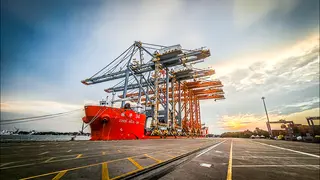APM Terminals Management BV, one of the world’s top four container port operators, is weighing plans to exit India by selling its stake in two facilities.
The tough regulatory environment and with no solution in sight to its tariff woes, the Danish giant is re-thinking its strategy for the country, which it entered in 2005 with much hope.
The company is understood to be in talks with potential investors/port operators to sell its 43.01 per cent stake in Pipavav Port and 74 per cent holding in Gateway Terminals India Pvt Ltd (GTI), one of the four terminals at Jawaharlal Nehru Port Trust (JNPT).
According to APM Terminals: “In the normal course of business, APM Terminals’ strategy is to continuously review and optimise its existing global portfolio as well as explore new investment opportunities. We are always looking at opportunities to grow the business and improve shareholder value. We do not comment on market rumours and speculation”.
But at least two persons briefed on the matter said that a deal was on the table. Port experts see this as a “desperate” move. APM Terminals has been critical of India’s regulatory environment, particularly on rate setting at major port trusts. But this flies in the face of its reported move to exit Pipavav, a private port, where it has the freedom to set rates.
GTI is India’s single biggest container terminal by volumes loaded. Yet, the terminal claims it is a loss-making entity. In the 11 years it has been operational, GTI has been subjected to two rounds of rate cuts by the Tariff Authority for Major Ports (TAMP). In March 2010, TAMP reduced rates by 10 per cent and followed it up with a steep cut of 44.28 per cent in February 2012. The 2012 rate-cut was stayed by the Bombay High Court. The court also allowed GTI to levy rates that prevailed before the reduction till the case was decided. According to the operator, the court stay saved the terminal from being shut. If GTI loses the case, it will have to refund more than ₹1,500 crore to customers as excess collected.
Also, the Centre and the older public private partnership (PPP) cargo handlers operating under a rate regime finalised in 2005 have been locked in a legal battle after the Shipping Ministry announced a new favourable rate regime for cargo handlers in July 2013 but excluded the existing operators from its ambit. Cargo handlers say that the 2005 guidelines penalise them for efficiency (handling more than the projected volumes) and want the government to shift them to the new regime. This case is also to be decided.
New BillThe Shipping Ministry, meanwhile, has been claiming that the port operators’ problems would be sorted out when Parliament approves a Bill to convert port trusts into authorities under which rate setting will be left to market forces. But the Bill also excludes those already operating such as GTI.
Port operators say that their issue was with the regulations and not with the regulator.








Comments
Comments have to be in English, and in full sentences. They cannot be abusive or personal. Please abide by our community guidelines for posting your comments.
We have migrated to a new commenting platform. If you are already a registered user of TheHindu Businessline and logged in, you may continue to engage with our articles. If you do not have an account please register and login to post comments. Users can access their older comments by logging into their accounts on Vuukle.